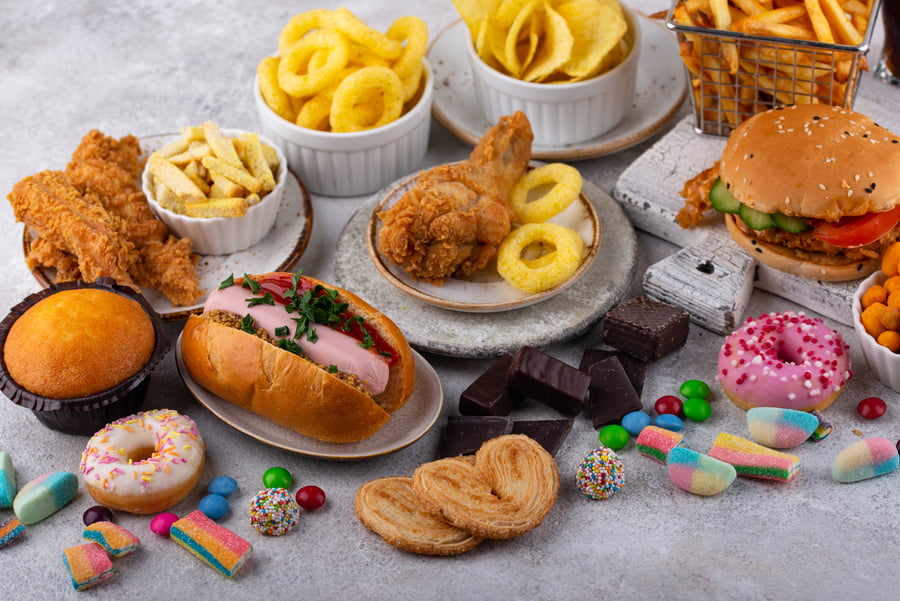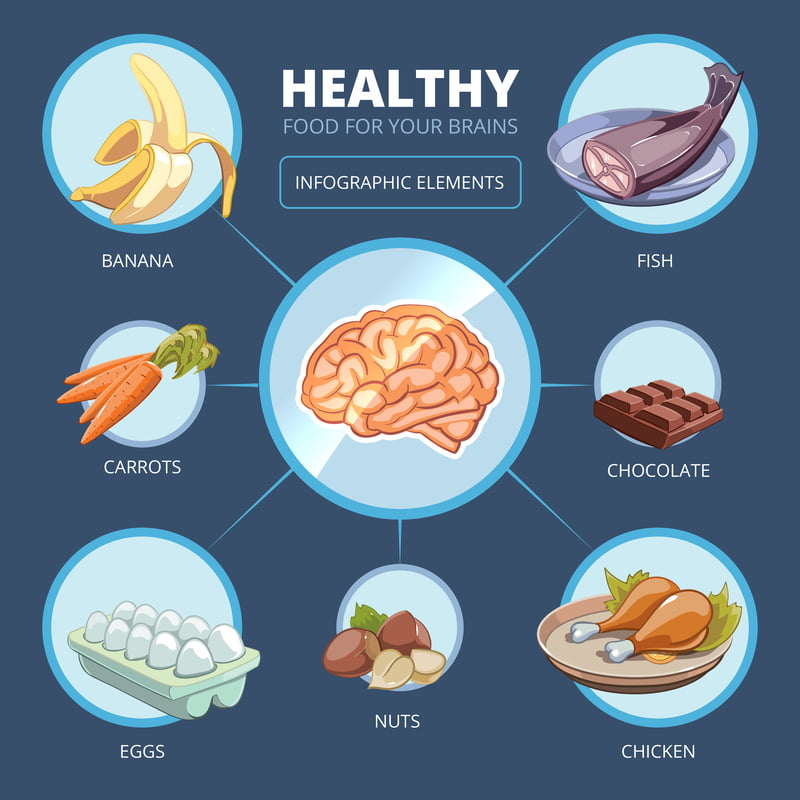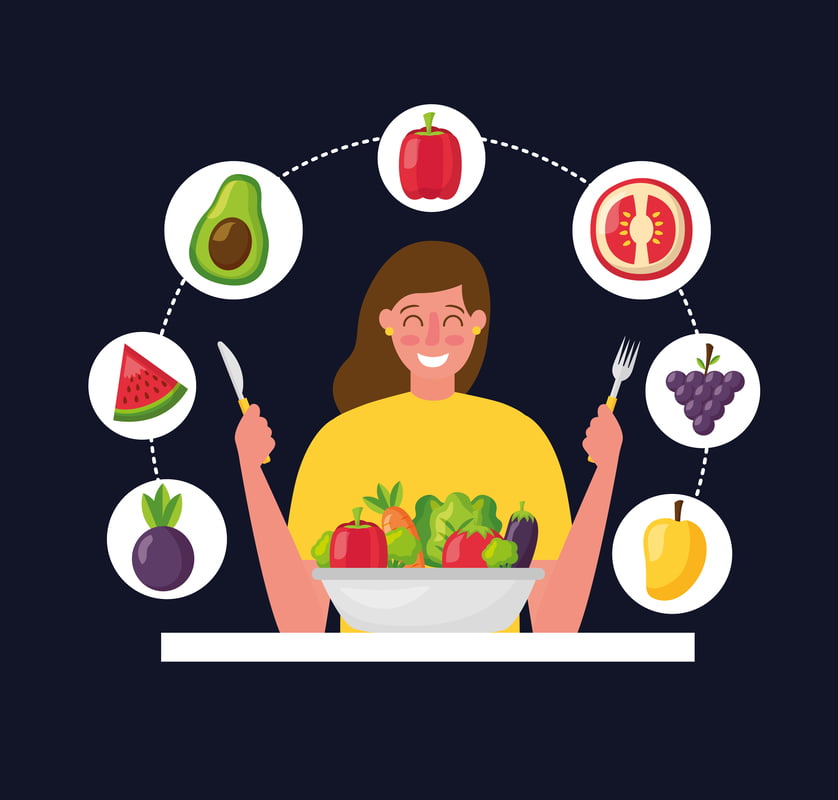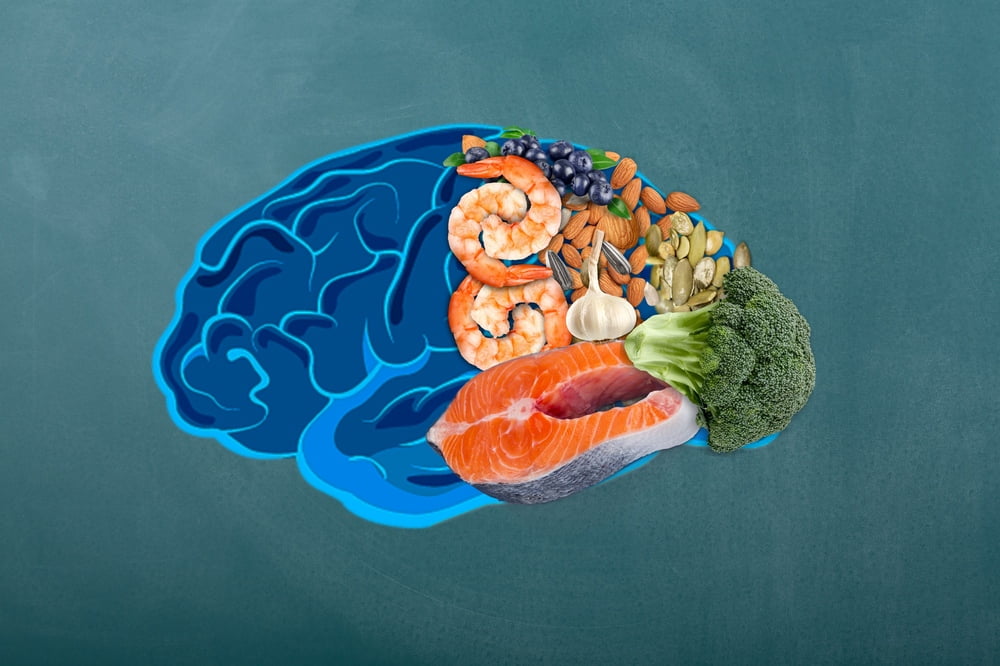Have you ever felt like your brain is stuck in slow motion? We all experience forgetfulness or mental fog from time to time. What if you could give your brain a natural performance boost?
Believe it or not, the food that you eat influences cognitive performance. Let’s investigate how what we eat impacts our brains and determine which are the best and worst brain boosting foods for brain function.
Effects of Fast Food on Brain Health
We all know that fast food is handy, but it comes at a cost. Daily fast food consumption is associated with a deterioration in cognitive performance. This is owing to the high levels of harmful fats, processed carbohydrates, and sodium in these meals. These substances can affect memory, concentration, and overall brain function.

Unveiling the Best and Worst Foods for Brain Health
Nutrient-Rich Champions
Let’s swap the fast food for brain-boosting all-stars! Here are some top contenders:
- Fatty Fish: Salmon, sardines, and mackerel are loaded with omega-3 fatty acids, which are crucial for brain development and function. Omega-3s enhance memory, learning, and concentration.
- Nuts and Seeds: Almonds, walnuts, and pumpkin seeds are powerhouses of healthy fats, protein, and vitamin E. These contribute to improved cognitive function and memory.
- Leafy Greens: Kale, spinach, and collard greens are packed with antioxidants and B vitamins, which protect brain cells and support cognitive function.
- Berries: Blueberries, strawberries, and raspberries are rich in antioxidants that fight inflammation and improve memory function.
The Sabotaging Squad
Now, let’s identify the foods that can negatively impact your brainpower:
- Sugary Drinks: Sugary sodas, juices, and energy drinks can lead to blood sugar spikes and crashes, impacting focus and memory.
- Refined Carbs: White bread, pasta, and pastries cause blood sugar spikes and inflammation, hindering brain function.
- Trans Fats: Found in processed foods like fried snacks and baked goods, trans fats can damage brain cells and contribute to cognitive decline.
- Excessive Alcohol Consumption: Overindulging in alcohol can impair memory, learning, and overall brain function.
Detoxifying the Body: Foods That Remove Heavy Metals
Heavy metals, like mercury, can accumulate in the body and harm brain function.
Here are some detox-friendly foods:
- Cilantro: This herb helps remove heavy metals from the body and may improve cognitive function.
- Chlorella: This green algae is a natural chelator, binding to heavy metals for elimination.
- Garlic: This flavorful ingredient helps protect brain cells from damage caused by heavy metals.
Steering Clear of Foods Detrimental to Dementia
While research is ongoing, some studies suggest a link between certain foods and an increased risk of dementia.
Here’s what to limit:
- Red Meat (Excessive Consumption): Excessive consumption of red meat has been linked to an increased risk of dementia. Opt for lean cuts and prioritise plant-based protein sources.
- Saturated Fats: Saturated fats found in fatty cuts of meat and processed foods may contribute to cognitive decline.
- Hydrogenated Oils: These oils, found in processed snacks and margarine, can negatively impact brain health.
Embracing Brain-Boosting Superfoods
Superfoods are nutrient-dense powerhouses that offer a concentrated punch of health benefits.
Here are some superstars for brain health:
- Dark Chocolate: Rich in antioxidants and flavanols, dark chocolate can improve memory and cognitive function. Choose dark chocolate with at least 70% cocoa content for maximum benefits.
- Turmeric: Curcumin, the active ingredient in turmeric, has anti-inflammatory and antioxidant properties that may protect brain cells and improve memory.
- Avocados: Avocados are loaded with healthy fats, vitamin E, and other brain-boosting nutrients.
Exploring the Power of the Number 1 Brain Food
While there is no single “magic bullet” diet for the brain, some options stand out. Fatty fish are typically regarded as the best brain diet due to their high omega-3 content. Omega-3s are necessary building blocks for brain cells and play an important role in memory, learning, and cognitive function.
Enhancing Brain IQ with Nutrient-Rich Foods
Looking to boost your cognitive performance? Consider incorporating these brain-boosting foods into your diet:
- Eggs: Eggs are a complete protein source and contain choline, a vital nutrient for memory and learning.
- Whole Grains: Whole grains like brown rice and quinoa provide sustained energy, keeping your brain focused and alert.
- Legumes: Beans and lentils are rich in B vitamins, protein, and fibre, all essential for optimal brain function.
These foods support brain health by providing essential nutrients like protein, choline, B vitamins, and fibre, which enhance memory, learning, focus, and energy levels.
Choosing the Best Fruits for Brain Health
Fruits are a delightful way to nourish your brain and your taste buds. Here are some champions in the fruit kingdom for optimal cognitive function:
- Berries (as mentioned before): These antioxidant powerhouses are a must-have. Blueberries, strawberries, raspberries, and blackberries are all excellent choices.
- Citrus Fruits: Oranges, grapefruits, and lemons are rich in vitamin C, which protects brain cells from damage and may improve memory.
- Kiwis: Don’t underestimate the little Kiwi! Packed with vitamin C, vitamin E, and antioxidants, kiwis are a brain-friendly treat.
- Apples: An apple a day might just keep the cognitive decline at bay! Apples contain quercetin, an antioxidant that may improve memory and protect brain cells.
Choosing the best fruits for brain health provides essential antioxidants, vitamins, and minerals that support cognitive function, improve memory, and protect against age-related decline.
Repairing Memory with Memory-Enhancing Foods
Certain diets have been linked to better memory performance. Their ability to provide the brain with vital nutrients that sustain cognitive processes. Antioxidants, omega-3 fatty acids, vitamins, and minerals help protect brain cells, increase neuronal connection, and aid in the creation of new memories. Individuals that include memory-enhancing foods such as berries, fatty fish, leafy greens, and nuts in their diets may have increased memory retention, recall, and overall cognitive function.
Here’s what to add to your plate:
- Fatty Fish: We can’t emphasise omega-3s enough! They play a crucial role in memory formation and recall.
- Leafy Greens: The B vitamins and folate found in leafy greens are essential for memory function.
- Tomatoes: Tomatoes are rich in lycopene, an antioxidant that may help protect memory and cognitive function.
Memory-Boosting Beverages
Staying hydrated is essential for general health, and there is no exception for your brain. Proper hydration promotes normal brain function by allowing the supply of nutrients and oxygen to brain cells, boosting neurotransmitter generation, and aiding in toxin clearance.
Here are some beverages scientifically proven to benefit memory:
- Water: The simplest and most essential drink! Dehydration can impair cognitive function, so staying hydrated is key for optimal memory.
- Green Tea: Green tea contains L-theanine, an amino acid that can improve memory and focus.
- Coffee: Coffee, in moderate amounts, can enhance alertness, focus, and memory.
Debunking Myths: Is Milk Good for the Brain?
Milk has long been linked to brain health due to its calcium concentration. While calcium is beneficial to overall health, research into the direct relationship between milk consumption and cognitive performance is unclear. Lactose intolerance can also reduce the benefits of milk.
Identifying 10 Foods to Avoid for Optimal Brain Health
Discover the critical foods to steer clear of in order to safeguard and enhance your cognitive function.
- Sugary Drinks: As mentioned before, sugary drinks can lead to blood sugar spikes and crashes, hindering focus and memory.
- Refined Carbs: White bread, pasta, and pastries cause blood sugar spikes and inflammation, impacting brain function.
- Trans Fats: Found in processed foods, trans fats damage brain cells and contribute to cognitive decline.
- Excessive Red Meat: Limit red meat consumption as it may be linked to an increased risk of dementia.
- Saturated Fats: Saturated fats from fatty cuts of meat and processed foods can negatively impact brain health.
- Hydrogenated Oils: These oils, found in processed snacks and margarine, can harm brain function.
- Excessive Alcohol Consumption: Overindulging in alcohol can impair memory, learning, and overall brain function.
- Artificial Sweeteners: While research is ongoing, some studies suggest artificial sweeteners may negatively affect cognitive function.
- Processed Meats: Hot dogs, sausages, and other processed meats are often high in sodium and unhealthy fats, which can harm brain health.
- Glutamate-Rich Foods: Excessive consumption of MSG (monosodium glutamate) found in some processed foods may be linked to headaches and cognitive issues.
Promoting Longevity: Foods That Decrease Life Expectancy
A healthy brain is often associated with a longer lifespan. Here are several meals related to a lower life expectancy that can potentially have a bad impact on brain function:
- Highly Processed Foods: Processed foods are often loaded with unhealthy fats, sodium, and sugar, all detrimental to brain health and overall well-being.
- Fried Foods: Fried foods are high in unhealthy fats and can contribute to inflammation throughout the body, including the brain.
- Excessive Added Sugar: A diet high in added sugar can lead to weight gain, diabetes, and cognitive decline.
Strengthening Your Mind: Tips for Brain Strength
A healthy diet is just one piece of the puzzle. Here are some additional tips to strengthen your brain naturally:
- Exercise Regularly: Physical activity increases blood flow to the brain, promoting the growth of new brain cells and improving cognitive function.
- Get Enough Sleep: When you’re sleep-deprived, your brain can’t function optimally. Aim for 7-8 hours of quality sleep each night.
- Challenge Your Brain: Regularly engage in mentally stimulating activities like puzzles, learning a new language, or reading.
Unlocking the Potential of Bananas for Brain Health
Bananas are a popular fruit often associated with potassium, but what about their impact on brain function? Bananas contain several nutrients that can benefit brain health:
- Vitamin B6: This vitamin plays a crucial role in the production of neurotransmitters, which are essential for communication between brain cells and memory function.
- Manganese: This mineral is involved in brain development and function, aiding in memory, focus, and learning.
- Natural Sugars: Bananas provide readily available carbohydrates for energy. The brain relies heavily on glucose for fuel, and bananas offer a natural source to keep your cognitive function sharp.
However, it’s worth noting that bananas are high in sugar. While the natural sugars in bananas provide a fast energy boost, eating too many might cause blood sugar to rise. Moderation is crucial!
Exploring the Top 10 Brain Foods for Optimal Cognitive Function
Let’s explore the essential foods that fuel your brain, enhancing cognitive performance for peak mental agility and well-being.
- Fatty Fish (Salmon, sardines, and mackerel): Rich in omega-3s, crucial for memory, learning, and concentration.
- Nuts and Seeds (Almonds, walnuts, and pumpkin seeds): Powerhouses of healthy fats, protein, and vitamin E, contributing to improved cognitive function and memory.
- Leafy Greens (Kale, spinach, collard greens): Packed with antioxidants and B vitamins, they protect brain cells and support cognitive function.
- Berries (Blueberries, strawberries, raspberries): Rich in antioxidants that fight inflammation and improve memory function.
- Eggs: A complete protein source containing choline, a vital nutrient for memory and learning.
- Whole Grains (Brown rice, quinoa): Provide sustained energy, keeping your brain focused and alert.
- Legumes (Beans, lentils): Rich in B vitamins, protein, and fibre, all essential for optimal brain function.
- Citrus Fruits (Oranges, grapefruits, lemons): Rich in vitamin C, protecting brain cells from damage and potentially improving memory.
- Dark Chocolate (At least 70% cocoa): Rich in antioxidants and flavanols, improving memory and cognitive function.
- Tomatoes: Rich in lycopene, an antioxidant that may help protect memory and cognitive function.

Harnessing the Power of Nuts for Brain Health
Nuts are a convenient and delicious way to incorporate brain-boosting nutrients into your diet. Here are the top 5 nuts to prioritise:
- Walnuts: Packed with omega-3s, alpha-linolenic acid (ALA), and antioxidants, all beneficial for brain function.
- Almonds: Excellent source of vitamin E, healthy fats, and protein, supporting memory and focus.
- Cashews: Rich in copper, magnesium, and B vitamins, which are important for brain cell health and function.
- Pistachios: Contain antioxidants, vitamin B6, and healthy fats, contributing to cognitive health.
- Pecans: A good source of zinc, manganese, and monounsaturated fats, which are beneficial for memory and learning.
Remember, variety is key! Include a mix of these nuts in your diet for a well-rounded approach to brain health.
Breakfast Choices for Brain Power
Breakfast is the most important meal of the day, especially for brain function. Here are some brain-boosting breakfast options to kickstart your cognitive function and memory retention:
- Oatmeal with Berries and Nuts: A fibre-rich and protein-packed breakfast that provides sustained energy and brain-boosting nutrients.
- Eggs with Whole-Wheat Toast and Avocado: Eggs offer protein and choline, while whole-wheat toast provides complex carbs for sustained energy, and avocado adds healthy fats.
- Greek Yoghurt with Berries and Granola: Greek yoghurt offers protein and probiotics, while berries provide antioxidants, and granola adds complex carbs and healthy fats.
- Smoothie with Spinach, Banana, and Almond Milk: A quick and convenient option packed with vitamins, minerals, and healthy fats to fuel your brain throughout the morning.

Strategies to Increase Neurons in the Brain
While the number of neurons naturally declines with age, there are ways to promote the growth of new neurons, a process called neurogenesis. Here are some strategies:
- Exercise Regularly: Physical activity stimulates the production of brain-derived neurotrophic factor (BDNF), which plays a role in neurogenesis.
- Learn New Things: Regularly challenging your brain with new skills or information can promote neurogenesis.
- Get Enough Sleep: During sleep, your brain consolidates memories and promotes neurogenesis.
- Manage Stress: Chronic stress can hinder neurogenesis. Practice relaxation techniques like meditation or yoga.
Natural Brain Sharpening Techniques
Looking for ways to sharpen your cognitive function beyond your diet? Here are some natural brain-sharpening techniques you can incorporate into your daily routine:
- Engage in Brain Training Games: Lumosity, Elevate, and Sudoku are just a few examples of brain training games designed to challenge your memory, focus, and problem-solving skills. While research on their long-term benefits is ongoing, they can be a fun way to keep your mind active.
- Practice Mindfulness Meditation: Mindfulness meditation involves focusing your attention on the present moment without judgement. This practice can improve focus, reduce stress, and enhance cognitive flexibility.
- Learn a New Language: Immersing yourself in a new language challenges your brain in multiple ways, boosting memory, focus, and multitasking abilities.
- Read Regularly: Reading exposes you to new information, strengthens vocabulary, and improves comprehension skills, all of which contribute to cognitive sharpness.
- Play Brain-Teasing Games: Crosswords, jigsaw puzzles, and logic puzzles require critical thinking and problem-solving skills, keeping your mind sharp and engaged.
- Socialise regularly: Engaging in social interaction stimulates the brain and can improve memory and cognitive function.
- Travel and Explore New Places: Immersing yourself in new environments challenges your brain to process new information and adapt, promoting cognitive flexibility.
- Get Organised: Staying organised reduces mental clutter, improves focus, and frees up mental space for complex tasks.
- Listen to Music: Listening to music can improve memory, focus, and cognitive function. Upbeat music can enhance mood and alertness, while classical music may improve spatial reasoning.
Remember: Consistency is essential. By adopting these brain-boosting practices into your everyday routine, you can maintain peak cognitive performance and mental health throughout your life.
Frequently Asked Questions
When it comes to memory function, certain foods shine brighter than others. Fatty fish like salmon are packed with omega-3s, essential for memory, learning, and concentration. Leafy greens come to the rescue with their abundance of B vitamins, which play a crucial role in memory function. And don’t forget about the antioxidant power of berries! These little fruits fight inflammation and improve memory function.
While there’s no single “superfood” for brainpower, fatty fish like salmon deserve a special mention. They’re loaded with omega-3s, which are crucial for memory, learning, and concentration, making them a great brainpower booster.
Several vitamins and food groups work together to keep your brain healthy. B vitamins, found in leafy greens and eggs, are important for memory function. Vitamin C, abundant in citrus fruits, protects brain cells from damage and may improve memory. Vitamin E, found in nuts and seeds, supports memory and focus. Don’t forget about healthy fats from nuts and avocados – they’re essential for brain cell health and function.
Vegetables, especially leafy greens, play a double role in brain development. They are packed with antioxidants that protect brain cells from damage. Additionally, they are a good source of B vitamins, which support cognitive function and may improve memory and learning.
Here’s a quick guide to some top brain-boosting choices:
Fruits: Berries (blueberries, strawberries, raspberries), citrus fruits (oranges, grapefruits, lemons)
Nuts: Walnuts, almonds, cashews, pistachios, pecans
Vegetables: Leafy greens (kale, spinach, collard greens), broccoli, tomatoes.
Your diet can significantly impact your brain memory. Focus on incorporating brain-boosting foods like those mentioned above. On the other hand, limit sugary drinks, refined carbs, trans fats, and excessive red meat consumption, as these can hinder memory function.
Water: The simplest and most essential drink!
Green Tea: Contains L-theanine, an amino acid that can improve memory and focus.
Coffee (in moderation): Enhances alertness, focus, and memory.
A healthy diet is just one piece of the puzzle when it comes to brain memory. Here are some additional strategies to sharpen your mind:
Brain training games: Challenge yourself with brain training games to keep your memory sharp.
Mindfulness meditation: Meditation can improve focus, reduce stress, and enhance cognitive flexibility, all of which benefit memory.
Learning a new language: Immersing yourself in a new language challenges your brain in several ways, boosting memory and cognitive function.
The food you choose plays a significant role in brain health. A diet rich in brain-boosting nutrients can improve memory and learning, enhance focus and concentration, protect brain cells from damage, and support overall cognitive function.
Unsweetened nuts like almonds, walnuts, and cashews are excellent choices for brain-healthy snacks. Water, green tea, and coffee (in moderation) are beneficial beverages to support brain health.
Yes, bananas contain some brain-healthy nutrients:
Vitamin B6, which supports neurotransmitter production, crucial for memory.
Manganese, which aids in brain development and function.
Natural sugars, which provide readily available energy for the brain.
However, moderation is key due to the high sugar content in bananas.
Almonds are a nutritious nut that supports brain health. However, no single food directly boosts IQ levels.
Fatty fish (rich in omega-3s)
Leafy greens (packed with B vitamins)
Berries (loaded with antioxidants)
For brain health, choose a variety of nuts: walnuts, almonds, cashews, pistachios, and pecans! They all pack nutrients that benefit memory, focus, and overall cognitive function.




